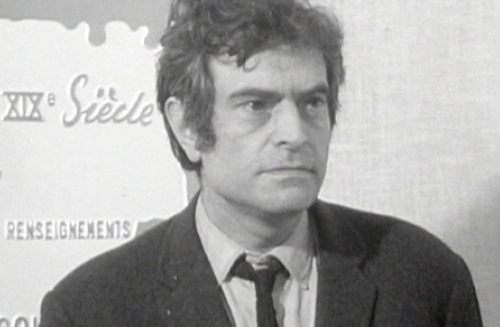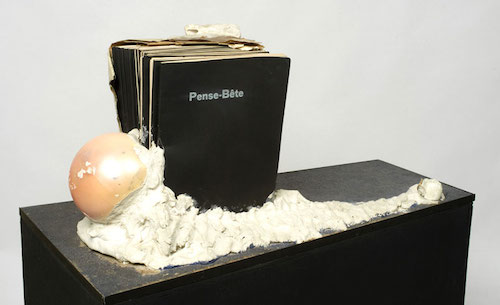
Is it me or is Marcel Broodthaers the new Vito Acconci in the poetry world, the de rigueur historical example of the poet/artist?
It seems rare nowadays to engage in a conversation dealing with conceptual art and writing that doesn’t touch on Broodthaers. His hold on those suffering from post-conceptual fatigue syndrome is not surprising if one considers the fluidity of his anti-disciplinarian imagination, which goes far beyond interventions such as the one he performed on Mallarmé’s Un coup de dés and comfortably traverses the interstices between language and the image in fiction, poetry, art, and cinema. There is nothing tautological about his museum fictions and treatment of the filmic, through inscriptions on both paper and celluloid, or about his collapsing of the roles of art critic, poet, artist, set designer, and curator, and this, to me, is the key to the myriad possibilities his work opens up.
(Fun fact: it was Magritte who first gave his young acolyte a copy of Un coup de dés, suggesting he give it a serious read. It only took Broodthaers twenty-five years to figure out what to do with it!)
The summer issue of frieze—on “Art & Poetry Now”—mentioned in my first post, features an article on sincerity and art, titled “In the Company of Flesh and Blood,” which springs precisely from an often-cited and famously unreliable claim that Broodthaers made in 1964 in the invitation to his debut art exhibition at Galerie Saint-Laurent in Brussels. It was titled “Moi aussi, je me suis demandé si je ne pouvais pas vendre quelque chose…” (I, too, wondered whether I couldn’t sell something…) and featured his first art object—fifty unsold copies of his poetry book/bestiary, Pense-Bête, affixed to a partially engulfing plaster explosion. The exhibition’s title came from Broodthaers’s explanation of the motives for his turn to art, included in the invitation to the show: “I, too, wondered whether I couldn’t sell something and succeed in life. I had, for quite a little while, been good for nothing. I am 40 years old. […] The idea of inventing something insincere finally crossed my mind and I set out to work at once.”

Anyone reading this who is not familiar with Broodthaers’s writing would be justified in assuming that he had, until this epiphanic moment, been writing sincere, first-person, at least quasi-lyrical poetry. That’s only one of the fictions that the claim produces, though. The very contents of Pense-Bête would prove the contrary, yet, small problem, the book has been rendered unreadable, so we have to believe the artist who has just admitted that he’s defected to the so-called realm of insincerity. A liar’s paradox? And lest I forget, what’s insincere about making visible the book’s sadly true lack of a readership?
Dare I quote Fernando Pessoa’s “Autopsychography”?
The poet is a faker
Who’s so good at his act
He even fakes the pain
Of pain he feels in fact.(tr. by Richard Zenith)
Best to have Broodthaers’s poetry speak for itself. Here are a couple of poems, anti-fables, to be sure, from Pense-Bête:
Clouds
Is it true that the jetty and the speckled trigger fish swim on the moon?
I don’t know. I don’t know.
My wife has gone to the aurora borealis.
I am a bag of cement in the cemetery.
The Cat and the Sea Snake
Animals don’t think. They are not of human
kind. They don’t know the fable.
I live my life without morality, says the cat, I’ve got
a mouse under my skin.
I repent with a sigh. Ah, it’s the end of the world.
Ah, on the murky water, I see a monster. Ah.(tr. by Jill Ramsey)
The fictions of Broodthaers’s body of work, and the institutional critique running through them, had more to do with his manipulations of conditions of display than with the actual content of any particular piece, which brings me to the institution of the poetry reading—perhaps the most prevalent way in which we display our work as poets nowadays. Regardless of whether poems get published or not, and apart from a journal’s or book’s actual readership, poetry has sprung off the page—the medium for poetry now is the reading. Anyone who has ever had to compete with an espresso machine’s screeching hisses or the drunken patter of a bar’s clientele (and who hasn’t?) knows that the conditions in which the work is delivered are of quintessential importance.
Everyone knows now that you can’t just get up and read your work without acknowledging that, if you want your audience not to go into the dreadful poetry trances of yore, deploying certain performative skills will be necessary.
What haven’t we seen? Some people get up on stage in costume, some orchestrate choral readings, some use projections and/or musical devices. Some move around in space, avoiding a fixed position before a mic. Some whisper, some shriek. Some perform pseudo-heroic runs to the stage when called to the podium. Some involve the audience. Some turn their backs on it.
One thing I hadn’t seen until I witnessed an exquisitely simple yet provocative performance by graphic designer, artist, and editor Will Holder at the Prelude Festival at CUNY in 2011 was someone refusing to showcase their own work, strategically choosing to unsettle the audience by delivering something not their own, sans explanation. For this particular event, Holder chose Adam Pendleton’s “Black Dada Manifesto,” but he has also “published,” among other works, Alice Notley’s Dr. Williams’ Heiresses, Clarice Lispector’s “A Woman Writer,” and Rachel Blau Duplessis in conversation with Charles Bernstein.
What Holder does is not appropriation; he does not intervene or plagiarize the material he chooses to “publish” vocally. If in print we’re savvy enough not to confuse the speaker of the poem with its author, it is in poetry readings that the bond linking voice (always “natural,” always revelatory), identity, and authorship is inextricably forged.
Holder explodes this bond. I was able to ask him about it recently. He was kind to answer my question in an extremely generous email excerpted here:
Although much of my work is paper-based, most of it has its editorial roots in conversation and speech. I'm often highlighting the discrepancy between what is said and what ends up in the page's mode. Duchamp told [Richard] Hamilton, in the late ’60s, that the language would always outlive the object it represents, and especially since the language allows itself to adapt, over time.
The preoccupation is with the body as readymade document/catalogue.
This relationship between language/information and presence, and the relocation of existing work, is drawn out in a series of oral publications that I have been making since 2007, "…for single mothers." The title is testimony to my conviction that the absence of a male voice in my upbringing is very present in my person. These are all texts that draw a large amount of attention to the publishing conditions, that is, “A bearded, white, heterosexual, European male takes the liberty to represent some universal views, typically expressed by women and homosexuals...”
Most of the texts are produced in a self-reflexive relation with race, gender, or the body. Alice Notley's Dr. Williams' Heiresses is pivotal—where she speaks on having found her imperative, speaking, female voice by way of Williams's very male structures. It is apparent that the contradiction of my white, male body has proven a good design for drawing out the text's specifics, and this, in my own view is the best form of typesetting I can produce. In most recent cases I have abandoned the page, with its in-built connotations of the author being elsewhere.
You may have noticed that I use "language/information" above. The situations in which the presence of my reading body is highlighted hope to draw out the non-linguistic information produced in that moment. Working with [Robert] Ashley, and his work, has, of course, produced a specific attention to this: the musicality of speech. In my case this could be extended to the musicality of commentary.
[Take] the phonological proposition: “the sounds that poems make are not […] treated as acoustic sonorities, but as semi-abstract representations of relations and orderings between and across sounds, within a textual domain.” It’s from this distinction that my own lack of interest in the performance of poems in their author’s own voice takes its origin; the specific occasional delivery is no more than an accidentalism of sound and behavior, since it is the language of the text that has and produces voice, and not the mere vocal equipment and habits of a speaker. An author-speaker of text in self-performance may seem to be a special case, in that features of such delivery can seem to be communicating an authentic textual inwardness, from the stance of an authorized knowledge and self-interpretation. But such semblance is really delusional; this is to undo the work of mental ears, by a kind of primitive literal-mindedness: “Look, the poet is wearing red socks! Now at last we understand everything!”
I can’t help but end by circling back to my first post via the fictions created by Broodtheaers’s self-cancelling “I, too, wondered whether I couldn’t sell something…” claim. It posits an artificial divide between the art and poetry worlds, by arguing that one realm is axiomatically linked to commerce, and the other to authenticity. Despite the falsehood of such binaries, it’s another one of those fixed ideas.
I’ve seen a love of language’s infinite plasticity seep out of Amy Sillman’s work as well. Voiceovers for a few of her iPad animations are poems by others, as in Draft of a voice-over for split screen video loop (2012), with a poem by Lisa Robertson, for instance, and Pinky’s Rule (2012), the result of a collaboration with Charles Bernstein. Sillman does the voicing in both, and the results are exhilarating in that they bring out qualities in the poems that might have been overlooked had their authors read them—they’re both released from the speech patterns of their makers, and in doing so, take flight.
![Amy Sillman & Charles Bernstein, Pinky’s Rule [still], 2011, Animated drawing, 7 minutes 38 seconds.](http://static.poetryfoundation.org/o/harriet/2014/07/Sillman.png)
I was able to query Sillman on her interest in poetry. Her words couldn’t provide a better endnote to these posts:
I absolutely love both the sound of voice, and just language itself. When I say love, I mean like libidinal, erotic, sensuous, mad, passionate love. I don’t love anything more in this world than language. To me, language is the mother, an invisible ocean, an oceanic mesh that both surrounds and enters our bodies, defying interior/exterior, logic/illogic, form/content, and all other binaries. It's out there and we can get on it like surfing. I’m sure that the euphoria that some people feel about surfing is how I feel about language. I like its sound—how it is used and changed and shattered and fragmented and put back together. I love how it enters and touches your eardrum. I like how it "means" and how it can shock and surprise and delight. I love how essentially all spoken language is improvised, and how everyone has their own subjective version of it, even though it has a larger logic or structure that sort of hovers around or above all of us. I love everything about it. I also love the body parts used in speaking, listening, and writing. It is a true love affair to me, or maybe one could say it's the only family I relate to. This is my very passionate love letter to language as a being, a thing, a force, a structure. Who wouldn’t love poetry the most of anything in this world: the play of that!?
It’s been real. Thank you Amy, and Will, and Marcel B., and why not, Marcel D. Thank you all. Let’s go surfing! Happy August.
Poet, translator, and scholar Mónica de la Torre was born and raised in Mexico City. She earned a BA...
Read Full Biography

